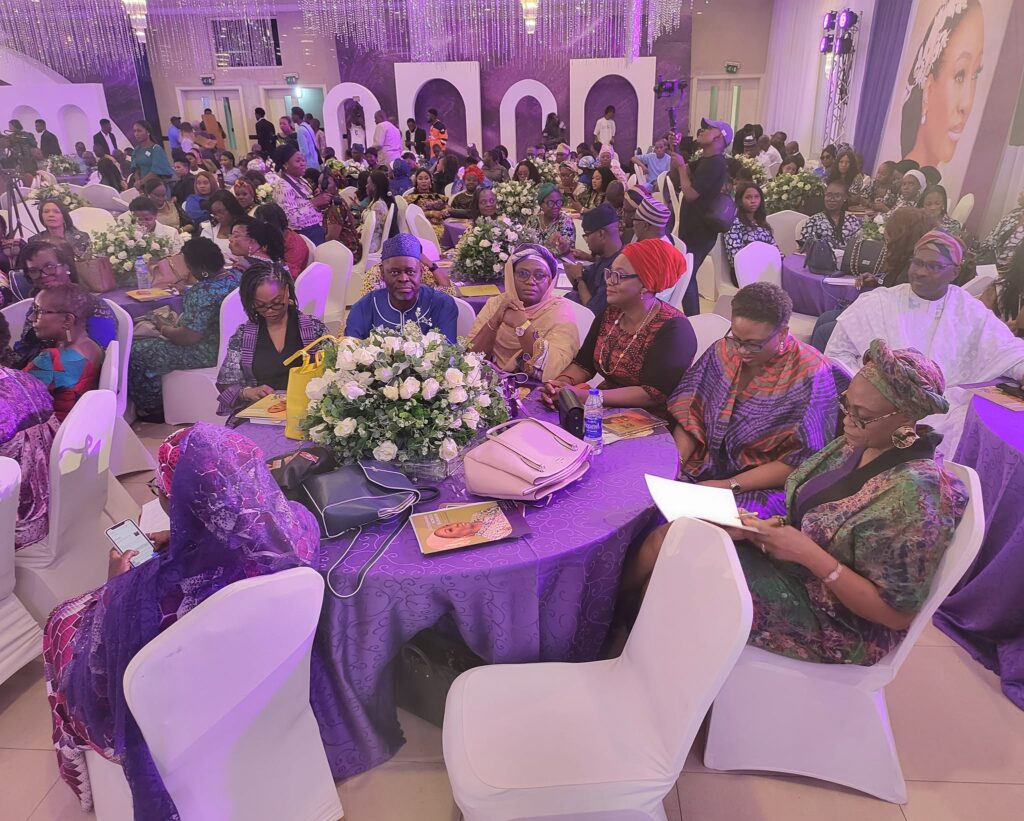REMARKS BY DR. OTIVE IGBUZOR, FOUNDING EXECUTIVE DIRECTOR OF THE AFRICAN CENTRE FOR LEADERSHIP, STRATEGY & DEVELOPMENT (CENTRE LSD) ON DEMAND AND SUPPLY (LOUD WHISPERS VOLUME 3) AT THE SISTERS ACROSS BORDERS CONFERENCE CELEBRATING THE LEADERSHIP JOURNEY OF ERELU BISI ADELEYE-FAYEMI @ 60 ON 10TH JUNE, 2023 AT CIVIC CENTRE, VICTORIA ISLAND, LAGOS.

Protocols
When I was informed that I will make a remark at this conference on Demand and Supply, the volume three of Loud Whispers by Erelu Bisi Adeleye-Fayemi, the first thing that came to my mind is Economics. I then remembered the popular secondary school Economics textbook, O Level Economics of West Africa by A. O. Lawal. In Economics, demand is a principle that captures the consumer’s desire to buy a product or service. Effective demand is ability backed by the willingness to pay. Supply refers to the quantity of goods a supplier offers to consumers. There are laws of demand and supply and how they modulate the prices of goods and services.

But when I received the manuscript of the book and started reading, I discovered that the book is not about economics at all. It is about demands for increased participation of women in leadership and governance; demands for action against sexual and gender-based violence; demands for gender equality and development; demands for an end to oppression and injustice and demands for voice, space, rights, accountability and more. It is also about supply of political will and resources to deal with the demands and supply of action and coherent thinking and action. It also deals with how to move the supply from a trickle to a flow and what can be done to keep the taps running- self-awareness, community ownership, partnerships, inter-generational conversations, healthy relationships, empathy and a commitment to building nations that place value on all citizens regardless of who or where they are.
Since this is a remark and not an academic review, I have elected to do three things namely to outline the themes that the book addressed, the stories that are contained in the book and the lessons from Demand and Supply.
THEMES OF DEMAND AND SUPPLY
The book, Demand and Supply is organised around nine themes namely:
Feminist theory and Activism
Leadership, Politics and Society
Social Justice
Sexual and Gender Based Violence (SGBV)
Inter-Generational issues
Relationships
Self-Awareness
Other observations- dealing with Online In-laws, London Bridge, Anger, Magun etc
Tributes
INTERESTING STORYTELLING
The book Demand and Supply is a collection of stories in the form of articles. Some academics contend that well researched articles should not be journalistic writings. But Bisi’s articles are a powerful blend of academics and journalism. The articles are essentially real-life stories of challenges that women face across the world. They include interviews of the author; papers presented at different fora; letter to Minister of Education who directed that sex education should be removed from the curriculum; experiences at the hands of American immigration officials; questions and answers to young people on Facebook; letter of resignation by Mrs. Emerald Udeakaji, Special Adviser to the Ebonyi State Governor so that she can be “submissive to her husband” according to the Bible; the passing of the first ever female combat flying helicopter pilot in Nigeria, Ms. Tolulope Arotile; the confirmation of Justice Ketanji Brown Jackson as a Supreme Court Judge; Poems; Ekiti State Government House built on a hill known as Oke Ayoba; negative WhatsApp messages; glossary of political terms such as Godfather, Godmother, barbed wire, on ground, consensus, stingy, carry along etc; Hilary Clinton; Donald Trump, Kamala Harris; period poverty (young girls who cannot afford sanitary pads); #EndSARS; close friends who experienced traumas and mental breakdowns; personal experiences of sexual advances by her lecturers; work as wife of Governor and Chairperson of Nigeria Governors Wives Forum; Vera Uwaila Omozuwa, the 22 year old Microbiology Student of the University of Benin who went to read in a church and was raped and murdered; 17 year old boy who raped a three year old child; five years old Hanifa Abubakar who was kidnapped and killed by her teacher Abdulmalik Tanko after collecting ransom; arrest of her security aide of ten years for rape; Michael Jackson and suspected cases of being a Paedophile; receiving telephone call 245 times from one person; the circumstances of a woman (Mama Tayo) who married five husbands at different times; Valentine’s day; Prince Harry Windsor and Ms. Meghan Markle; a young woman who went with her boyfriend to visit his mother and sisters for the first time and was asked to wash off her make up so that they can see her face properly; Covid 19; a Pastor who sexually abused a 13 year old and the Pastor was eventually sent to Prison; experience at Great Ife as a Kegite and the ethnic biased counsel from a Professor; Magun; Hilda Baci (the Guiness Book of World Records Cook of 100 hours, forty minutes) and Tributes to Pa Emmanuel Akinola Adeleye, Mama Clementina Ojuolape Adeniyi, Innocent Chukwuma, Professor Bolanle Awe @ 90, Fumilayo Olayinka, Professor Abena Busia @ 70, Tina Turner and Eventful, Nigeria’s foremost events planning company on their 20th anniversary.
LESSONS FROM DEMAND AND SUPPLY
One of the biggest lessons from the book for me is how to conduct activism and focus on results. As the author noted herself, “I have learnt that when you find yourself walking the same corridors for thirty years making the same demands, you understand how to manage contradictions as long as it will help move the supply from a trickle to a flow” (Page xxiv). The problem with many people in the world today is that they focus on activities without result. They are very busy. They engage in activities but there is no focus for results. It is therefore important for individuals, organisations and nations to focus on results rather than activities.
Secondly, another lesson from the book is to always think about the fact that what is good for the goose is also good for the gander. Men and women should be held to the same standards. In other words, if it is good to display the jewelleries of corrupt women, then it will also be good to display the wristwatches and diamond cuff-links of corrupt men.
The third lesson is the appreciation of the role of men in Feminism and the fight for gender equality and women empowerment. She argues that we should thank Feminism “for every woman who appreciates men of virtue, men of value, men of honour, men of respect, men without a sense of entitlement.”
Another lesson is the respect of the author for other people’s perspectives. As she stated clearly, “I therefore respect Mrs. Udeakaji’s decision to resign in order to spend time with her family”. As human beings and even as activists, we must recognise that our perspectives are shaped by our ideology, knowledge, training, orientation and experience. We cannot all see things or behave the same way. You should not expect everyone to live their lives they way you want it.
One other clear lesson from the book is the “need to begin with legacy in mind” (page 79). As human beings and as activists, we must be concerned about our legacies. As a leader, building a lasting legacy is arguably one of the most important things that you can do in your life because it enables you to have influence into the future. Building a lasting legacy will help you to optimise your impact on your organisation and people now and into the future. Natalie Babbit once counselled: “Don’t be afraid of death; be afraid of an unlived life. You don’t have to live forever. You just have to live.” It is therefore imperative for every leader to build a lasting legacy. Building legacy is important for any leader because it will enable the leader to impact on his/her organisation and people now and into the future.
Furthermore, there are articles written by the author when she was angry. In one of the articles, she stated that “In am angry. On a scale of one to ten, my anger is twenty” (Page 314). The lesson here is that anger is a motivation for action. I agree with the author completely that anger can be a motivation for action. As Nelson Mandela noted:
“I had no epiphany, no singular revelation, no moment of truth, but a steady accumulation of a thousand slights, a thousand indignities and a thousand unremembered moments produced in me an anger, a rebelliousness, a desire to fight the system that imprisoned my people. There was no particular day on which I said, Henceforth I will devote myself to the liberation of my people; instead, I simply found myself doing so, and could not do otherwise.”
According to Martin Luther King, Jr (1968), the harnessing of anger is the greatest of tasks:
“The supreme task is to organize and unite people so that their anger becomes a transforming force.”
Gandhi (1929) also talks about the harnessing of anger as a powerful force for justice:
“I have learned through bitter experience the one supreme lesson to conserve my anger, and as heat conserved is transmuted into energy, even so, our anger controlled can be transmuted into a power which can move the world.”
I hope that when you read the book, you will be sufficiently angry to fight for gender justice.
Finally, a great lesson from the book is the need to make commitments. As the author argued, “for as long as women are deprived of their rightful place, demands will be made, and we all need to ask ourselves where we are in the supply chain” (page xxvi).
CONCLUSION
Demand and Supply by Erelu Bisi Adeleye-Fayemi is a great book. Bisi Adeleye-Fayemi is a great story teller. You cannot read the book without being moved. If you are an activist, you will be moved never to give up on activism no matter your position. If you are not an activist, you will be moved by the great work that activists are doing to make the world a better place for both men and women. As a human being, you will be moved by different emotions reading this book- laughter about some funny stories, anger about what patriarchy and society is doing to women and girls, frustration about shortage of supply and indignation that may make you to make a commitment to join the struggle for women empowerment and gender equality. Whatever be the case, no one can read this book and not be moved one way or the other. We must move away from “a complicit society of male enforcers and women enablers” of marginalisation, discrimination and oppression of women.
I therefore commend this book to everyone interested in humanity and a peaceful and progressive society.
God bless you all.
